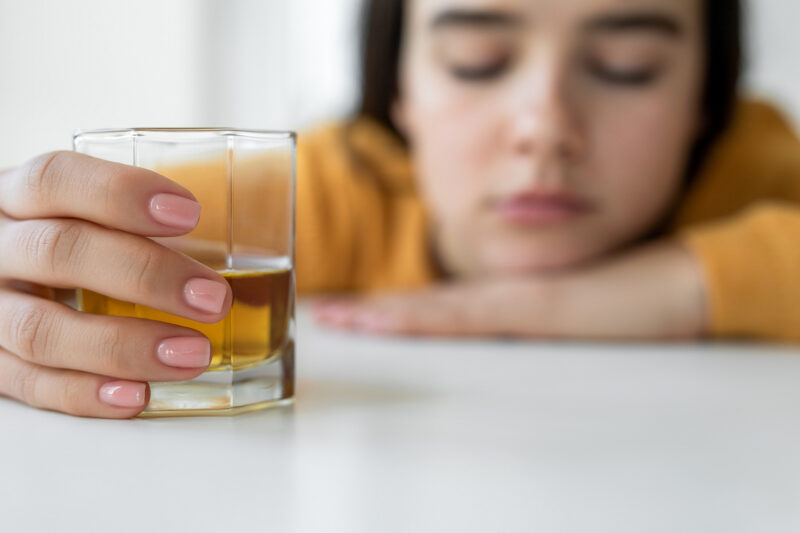
Table of Contents
Therapists Explain How To Quit Drinking

Written By: Sarah Fielding

Clinically Reviewed By: Krystal Batista
July 22, 2025
5 min.
Six expert-approved tips about how to quit drinking and manage alcohol withdrawal.
Learn more about our Clinical Review Process
Table of Contents
Drinking alcohol is a common part of life for many people. It can be a way of being social or celebrating an event, but it can also lead to an unhealthy drinking habit or even a substance use disorder. “Whether it’s disrupting your sleep, increasing anxiety or depression, causing problems in relationships, or impacting your ability to be fully present — alcohol often amplifies the very things people drink to escape,” says Charlie Health Group Facilitator Bree Williams, LPCA.
So, when is it time to stop consuming alcohol? We’ve spoken with experts about everything from how to quit drinking to managing alcohol withdrawal. Read on to learn more.

We can help you quit drinking
Virtual, intensive therapy and medication-assisted treatment, where available, to support long-term recovery.
How to quit drinking
Quitting alcohol is a process that requires time, self-care, and support. These are some of the steps you can take to stop consuming alcohol.
1. Think about your why
The first hurdle is acknowledging any issues you’re experiencing with alcohol. Maybe you’re missing responsibilities, feeling an impact on your mood, or having adverse health reactions. “Get really honest with yourself,” says Williams. “Write those reasons down. They’ll become your anchor.”
2. Create a new routine
Has a lot of your free time been spent going to the bar, meeting friends for a drink, or planning a night out? As Williams says, “Drinking often fills time, quiets thoughts, or marks transitions.” It’s important to fill that time with other things that nourish you, whether they be trying different types of tea, engaging in some sort of movement, taking up a new hobby you’ve always wanted to pursue, or journaling.
3. Set goals
Goals can be as simple as not ordering a glass of wine with dinner. Create small, more manageable goals to add a greater sense of accomplishment and confidence to your journey.

Here’s How Setting Goals Can Positively Impact Your Mental Health
Charlie Health Editorial Team
4. Be aware of triggers
There are going to be certain things that make it harder to commit to being sober. “Know the moments, people, or feelings that make you want to reach for a drink,” says Williams. “Have a plan in place. That might look like stepping outside, texting your support person, or repeating a grounding affirmation like ‘I’m doing something different this time.’”
Lonano notes that it can be especially helpful to get rid of any easily accessible alcohol, reducing the temptation to drink it.
5. Lean on your support systems
You are not in this alone. You can turn to friends and family, a therapist, a group like Alcoholics Anonymous, or even an online community, says Williams. These people can keep you accountable and supported throughout your life.
6. Get help
Choosing to stop drinking can be a challenging experience that depends on our alcohol consumption and alcohol dependence. Charlie Health Group Facilitator Nicole Lonano, MS, recommends engaging in treatment with the help of trained medical professionals or entering a detox program at a treatment center. Working with professionals is a treatment option that can mitigate risks, help you manage alcohol cravings, and support you in reaching sobriety — especially if you experience alcohol withdrawal.
Why some people decide to quit drinking
The decision to stop drinking alcohol is a very personal one that can be based on several factors. You might find yourself spending too much money or not trying anything new. You might also not like the long-term impact of alcohol on you or your relationships. “I’ve worked with many clients who didn’t even realize how much alcohol was interfering with their lives until they tried to step back,” says Williams.
Stopping your alcohol consumption can be life-changing. “Choosing to quit is not just about saying no to alcohol; it’s about saying yes to a clearer mind, more emotional stability, and deeper self-awareness,” says Williams.
It can also have tremendous benefits on your relationships, finances, sleep, cognitive functions, and mental health, says Lonano. Take sleep, which alcohol can initially appear to help. Over time, it can disrupt your sleep patterns and how well you sleep, adds Lonano.
Then there’s the cognitive and mental health aspects. “Alcohol can impair cognitive functions like memory, concentration, and decision making. Quitting can help improve these functions and possibly reverse some cognitive damage,” says Lonano.
As for mental health, she adds: “Alcohol is a depressant and can worsen symptoms of anxiety and depression. Stopping drinking can improve mood, reduce anxiety, and improve mental health conditions.”
What is alcohol withdrawal?
The experience someone has when quitting drinking might look very different depending on their current intake. According to the fifth edition of the Diagnostic and Statistical Manual of Mental Disorders (DSM-5), a person can experience mild, moderate, or severe alcohol use disorder (AUD). If you live with AUD or engage in heavy drinking, then you might experience withdrawal symptoms including:
- Tremors
- Sweating
- Anxiety
- Nausea or vomiting
- Seizures
- Elevated pulse
- High blood pressure
- Insomnia
Alcohol withdrawal symptoms can be challenging to manage. As Williams puts it, “The first few days to weeks can be emotionally raw — and that’s normal. You might feel anxious, irritable, or have trouble sleeping. That’s your nervous system adjusting and your body detoxing.” Severe withdrawal symptoms when you quit alcohol can require getting specialized medical help.
Over time, your body and mind’s reaction to you having quit alcohol can improve drastically.
According to Williams, you can start experiencing:
- Deeper sleep
- A more stable mood
- Greater mental clarity
- More confidence and control over your life
- Reconnected with an earlier version of yourself
Above all else, be gentle with yourself during this journey. “Quitting drinking isn’t about perfection — it’s about progress,” says Williams. “If you slip, that doesn’t mean you’ve failed. It just means you’re human. Give yourself grace and get curious, not judgmental.”

How Charlie Health can help
If you or a loved one is struggling with alcohol use disorder (AUD) and wants to quit drinking, Charlie Health can help. Our virtual Intensive Outpatient Program (IOP) offers more than once-weekly mental health treatment for people dealing with serious behavioral health conditions — including AUD. Our certified medical professionals can provide support with severe withdrawal symptoms and we offer medication-assisted treatment in select states. With this kind of support, healing is possible. Fill out the form below or give us a call to start your healing journey today.
References
https://www.niaaa.nih.gov/health-professionals-communities/core-resource-on-alcohol/alcohol-use-disorder-risk-diagnosis-recovery#pub-toc4




